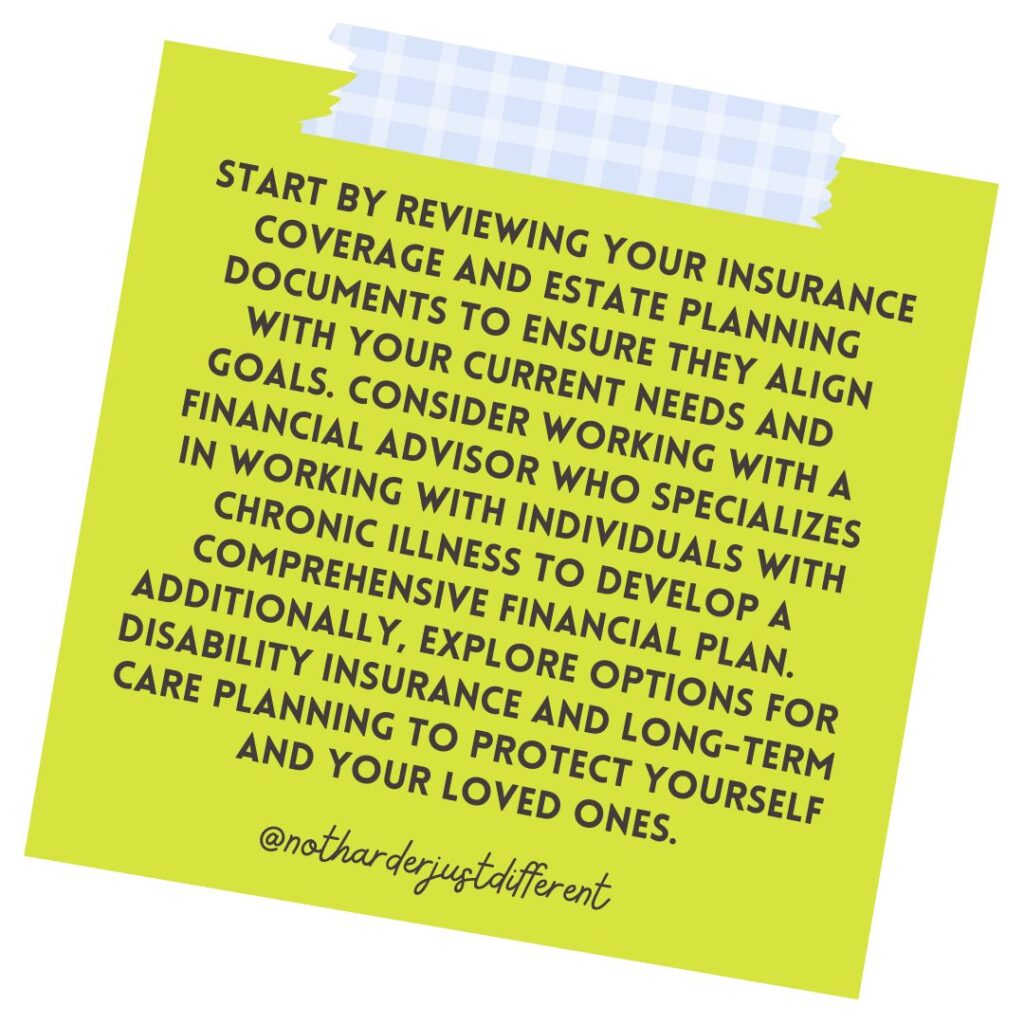Disclaimer: As a future Licensed Clinical Social Worker (LCSW) currently pursuing my master’s degree, I am passionate about sharing insights and information related to parenting, autism and homeschooling based on my personal experiences and research. However, the content shared on this blog is not intended to substitute professional advice, diagnosis, or treatment. Parenting is a deeply personal journey, and while I strive to provide valuable insights, every family and situation is unique. Readers are encouraged to consult with qualified professionals for personalized guidance tailored to their specific needs and circumstances.
Let’s have a candid conversation about a topic that’s often overlooked but incredibly important—financial planning with chronic illness, especially when you’re living with the challenges of chronic illness. I totally understand that managing your health is your top priority, but taking control of your finances can provide a sense of security and stability in uncertain times.
Living with chronic illness often comes with its own set of financial challenges, from medical bills and prescription costs to potential loss of income due to illness-related limitations. It’s understandable to feel overwhelmed, but with the right approach, you can take proactive steps to manage your finances and protect your financial well-being. Whether you’re dealing with a recent diagnosis or you’ve been living with chronic illness for years, it’s never too late to start planning for your financial future.
Imagine a future where you have the financial resources to cover medical expenses, maintain your standard of living, and achieve your long-term goals, despite the challenges of chronic illness. It may seem daunting, but trust me—you have the power to make it happen. By educating yourself about financial planning strategies, seeking out resources and support, and taking practical steps to manage your finances, you can build a brighter future for yourself and your loved ones, one step at a time.
Important Disclaimer: While I strive to provide helpful information, I am not a financial expert. It’s important to consult with a qualified financial professional before making any financial decisions. They can provide personalized advice tailored to your specific circumstances and help you navigate the complexities of financial planning, especially when dealing with chronic illness. Always seek professional guidance when in doubt.

5 Tips for Financial Planning with Chronic Illness
Managing Medical Expenses
Living with chronic illness often means facing significant medical expenses. To manage these costs effectively, start by understanding your insurance coverage and exploring options for financial assistance. Consider negotiating payment plans with healthcare providers and seeking out generic or lower-cost medication alternatives. Additionally, keeping detailed records of your medical expenses can help you track your spending and identify areas where you can cut costs.
Here are some tips to help you manage medical expenses:
- Understand your insurance coverage, including deductibles, copays, and out-of-pocket maximums.
- Research financial assistance programs offered by pharmaceutical companies, nonprofit organizations, and government agencies.
- Ask your healthcare provider about options for reducing costs, such as using generic medications or participating in clinical trials.
- Keep detailed records of your medical expenses, including bills, receipts, and insurance statements.
- Consider setting up a dedicated savings account for medical expenses and contribute to it regularly to build a financial cushion.
Budgeting and Saving
Creating a budget is essential for managing your finances effectively, especially when living with chronic illness. Start by tracking your income and expenses to identify areas where you can cut back and save money. Consider using budgeting apps or spreadsheets to help you stay organized and track your spending. Additionally, building an emergency fund can provide a financial safety net for unexpected expenses or income disruptions.
Here are some tips to help you budget and save:
- Track your income and expenses to identify areas where you can cut back.
- Use budgeting apps or spreadsheets to help you stay organized and track your spending.
- Set realistic savings goals and work towards building an emergency fund that covers 3-6 months of living expenses.
- Automate your savings by setting up recurring transfers to a dedicated savings account.
- Review your budget regularly and make adjustments as needed to reflect changes in your income or expenses.

Securing Your Financial Future
Planning for the future is crucial when living with chronic illness. Start by reviewing your insurance coverage and estate planning documents to ensure they align with your current needs and goals. Consider working with a financial advisor who specializes in working with individuals with chronic illness to develop a comprehensive financial plan. Additionally, explore options for disability insurance and long-term care planning to protect yourself and your loved ones.
Here are some tips to help you secure your financial future:
- Review your insurance coverage, including health, life, and disability insurance policies, to ensure they provide adequate protection.
- Create or update your estate planning documents, including wills, trusts, and powers of attorney, to reflect your wishes and protect your assets.
- Consider purchasing disability insurance to replace lost income if you become unable to work due to illness or injury.
- Explore long-term care planning options, such as purchasing long-term care insurance or setting aside funds for future care needs.
- Work with a financial advisor who understands the unique challenges of living with chronic illness to develop a customized financial plan that addresses your needs and goals.
Building a Support Network
Building a strong support network is essential when navigating financial planning with chronic illness. Seek out support groups, online communities, and advocacy organizations that can provide guidance, resources, and emotional support. Additionally, consider reaching out to friends and family members for practical assistance and encouragement.
Here are some tips to help you build a support network:
- Join support groups or online communities for individuals with chronic illness to connect with others who understand your experiences and can offer advice and support.
- Reach out to friends and family members for practical assistance, such as help with household chores, transportation to medical appointments, or childcare.
- Consider working with a financial advisor or planner who specializes in working with individuals with chronic illness to develop a comprehensive financial plan that addresses your unique needs and goals.
- Advocate for yourself by researching your rights and entitlements under disability laws and insurance policies, and seeking assistance from legal or advocacy organizations if needed.
- Take care of your emotional well-being by practicing self-care activities such as meditation, mindfulness, or engaging in hobbies or activities that bring you joy and relaxation.
Finding Additional Resources
Finding additional resources can provide valuable support and assistance when managing financial planning with chronic illness. Explore government programs, nonprofit organizations, and community resources that offer financial assistance, legal aid, and other services. Additionally, consider seeking out educational resources, such as books, articles, and online courses, to help you learn more about financial planning strategies and techniques.
Here are some tips to help you find additional resources:
- Research government programs such as Medicaid, Medicare, and Social Security Disability Insurance (SSDI) that may provide financial assistance and support for individuals with chronic illness.
- Explore nonprofit organizations and advocacy groups that offer financial assistance, support services, and advocacy on behalf of individuals with chronic illness.
- Look for community resources such as food banks, housing assistance programs, and utility assistance programs that can help alleviate financial strain and provide support during difficult times.
- Seek out educational resources such as books, articles, and online courses that offer guidance and advice on financial planning strategies for individuals with chronic illness.
- Don’t hesitate to reach out to local social service agencies, legal aid organizations, or financial counselors for assistance and support in navigating your financial challenges.
Navigating financial planning with chronic illness can be challenging, but with the right strategies and support, it’s possible to secure your financial future and achieve peace of mind. Remember to prioritize managing medical expenses, budgeting and saving, and securing your financial future through insurance and estate planning. Building a strong support network and seeking out additional resources can also provide valuable assistance along the way. And most importantly, don’t hesitate to consult with a qualified financial professional for personalized guidance and advice. By taking proactive steps and seeking support when needed, you can take control of your finances and focus on living your best life, despite the challenges of chronic illness.

